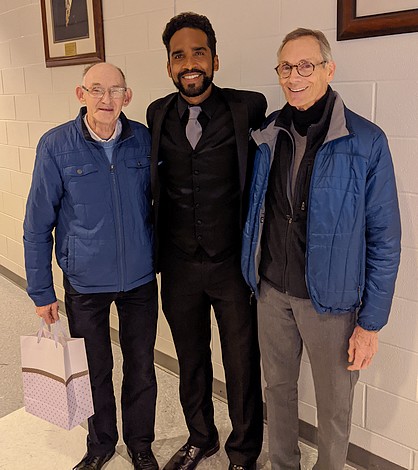
ReviewsPortsmouth Community Concerts presents Orson Van Gay IIPCCI: Orson Van Gay II, tenor As part of the Portsmouth Community Concerts season, tenor Orson Van Gay II gave a recital of what he called “a gumbo souffle of songs.” He is building a career on the west coast, performing as a tenor soloist at Walt Disney Hall and the Los Angeles Opera and Pacific Opera's production of La Traviata and Long Beach Opera's The Central Park Five. He made his Carnegie Hall debut in spring of 2019. Sally Raney Copeland was his piano accompanist. Ms. Copeland is Director of Community Music at Old Dominion University where she also teaches piano. Mr. Van Gay opened with De miei bollenti spiriti from La Traviata. He stood quietly on stage, entering the character emotionally before he sang with a liquid silver tone. Violetta is smitten by Alfredo, even though she is a courtesan kept by rich, older men. When she returns his love Alfredo sings of his deep commitment to her. Continuing the Italian set we heard Giordani's Caro mio ben and Tosti's Ideale. With small, effective gestures he gave us this sunny Neapolitan melody loaded with emotional colors. Mr. Van Gay never overwhelmed this accessible little tune. Before turning to African American art song, he sang Ah, leve toi soleil from Massenet's Roméo et Juliette with its powerful, dramatic ending. Mr. Van Gay's voice has the distinction of having a smooth sound throughout his entire vocal range. Harry T. Burleigh (1866-1949) was the first African American composer of art song. Setting the poetry of Lawrence Hope, we heard five songs notable by their flagrant emotionalism. Hope was actually the woman writer Adela Nicolson. These songs are all of a piece with no contrast from one to another. He sang of love, joy and pain, symbolized by flowers and tears. Even in death the poet is lulled to sleep with a kiss! After intermission the songs were all in English and most were by contemporary composers. Both Ricky Ian Gordon (b. 1956) and John Musto (b. 1954) set poems by the great African American poet Langston Hughes (1902-1967) who was part of the Harlem Renaissance. From Musto's Shadow of the Blues cycle came Silhouette which describes the lynching of a black man in the dark of the moon and ends with “Southern gentle lady, Be good! Be good!” Mr. Van Gay's delivery was profound. Litany speaks of compassion for "the sick, desperate, depraved scum" of New York City: “Gather up in the arms of your pity …the arms of your love— those who expect no love from above.” This text was also set by Gordon in his cycle Only Heaven. There was a marked contrast of how each composer set the word “love”— Musto's was emotionally juicy while Gordon's was more matter-of-fact and then operatic. Our singer had a lovely tone in Musto's and created excitement in Gordon's. Harlem Night Song, one of Hughes' loveliest poems, speaks of a loving couple roaming the city, singing under a blue night sky with a shining moon. We hear a distant band voiced in the piano accompaniment. The singer's clear, nuanced singing created this special moment in time. This mood of ecstasy continues in Gordon's Stars as the text encourages “reach out your hand, dark boy, and take a star— just one star.” The last set was spirituals. Give Me Jesus, arranged by Moses Hogan (1957-2003) opened with “Somebody's knocking at your door” repeated with many variations, encouraging the sinner to open the door to his heart. Once opened, Give Me Jesus is the response, followed by My Soul's Been Anchored in the Lord by Florence B. Price (1887-1953), the first black women to achieve distinction as a composer.  John Campbell, Orson Van Gay II, Steve Brockman We first heard Orson sing while he was a student at Old Dominion University (2010-2011) where he studied with Kerry Jennings and Agnes Mobley Wynn. Three reviews from that time can be found HERE. While in Hampton Roads his passion for singing led to the studio of Sondra Gelb who was in the audience. Ms. Gelb, who had a career singing opera in New York City before settling here, has helped many young singers prepare for their professional careers in a broader world of performance. For aspiring singers, age 16 and older, Ms. Gelb has openings in her studio and can be reached at(757) 615-3288. Back to Top Review Index Home Calendar Announcements Issues Reviews Articles Contact Us |